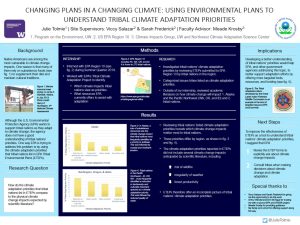Changing Plans In A Changing Climate: Using Environmental Plans To Understand Tribal Climate Adaptation Priorities
Native Americans are among the most vulnerable to climate change impacts. The U.S. Environmental Protection Agency (EPA) wants to support tribal nations as they adapt to climate change, but the agency does not have a good understanding of tribal nations’ priorities. The purpose of this study was to investigate 1) how the climate adaptation priorities that tribal nations list in EPA Tribal Environmental Plans (ETEPs) compare to the physical climate change impacts that scientific literature expects for the Pacific Northwest and Alaska and 2) how effective ETEPs are as a tool for understanding the climate adaptation priorities of tribal nations in this region. As an intern with EPA Region 10 (Washington, Oregon, Idaho, and Alaska), I investigated tribal nations’ climate adaptation priorities by reviewing all ETEPs submitted between 2014 and 2018. I also reviewed academic literature on how climate change will impact the Pacific Northwest and Alaska, as well as tribal nations in those regions. My findings show that the climate adaptation priorities reported in ETEPs did not include several climate change impacts anticipated by scientific literature. These include decreased forest productivity, increased risk of wildfire, and increased irregularity of weather. Revising ETEP forms could provide EPA with a more accurate picture of tribal nations’ climate adaptation priorities. This would help EPA, and other government agencies addressing this topic, to better support adaptation efforts by offering more targeted tools, resources, and funding.
